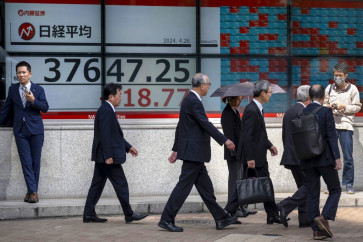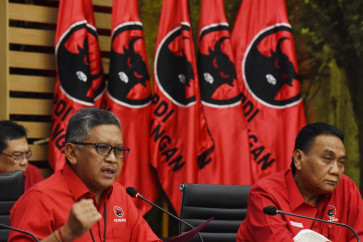Shift to manufacturing 'critical for growth'
Economy in Focus: Finance Minister Bambang Brodjonegoro (left) and HSBC Indonesia CEO Sumit Dutta converse while leaving the stage after opening the Indonesia Economic Outlook 2015 in Jakarta on Tuesday
Change Size

E
span class="inline inline-center">Economy in Focus: Finance Minister Bambang Brodjonegoro (left) and HSBC Indonesia CEO Sumit Dutta converse while leaving the stage after opening the Indonesia Economic Outlook 2015 in Jakarta on Tuesday. The seminar discussed the 'Momentum to Accelerate'. JP/Ricky Yudhistira
Indonesia needs to prioritize development of the manufacturing industry to ensure long-term growth, analysts say.
Analysts said the country could no longer count on the commodity-based economy to maintain economic growth.
'For many years, Indonesia had an easy ride with commodity prices, but [the price hype] is coming off and it's only now that the urgency of the shift is setting in,' Frederic Neumann, HSBC managing director and co-head of Asian economic research, said on Tuesday on the sidelines of HSBC's 2015 economic outlook event.
He added that Indonesia had a good chance of capturing some of the industrialization opening up in the Southeast Asian region, including textiles and plantations, two lower-end manufacturing sectors the country could leverage.
'There are a lot of multinational companies looking to relocate their production bases and Indonesia can attract some of those investments by offering incentives and a new tax regime,' Neumann said.
Indonesia's low debt-to-gross domestic product (GDP) ratio may work in the country's favor, as it provides sufficient room to generate financing for numerous projects.
Data from HSBC and CEIC show that Indonesia's ratio stood at less than 60 percent of GDP. The government's own debt-to-GDP ratio ' as stated within the 2015 revised state budget ' still hovers between 25 and 26 percent.
Compared with other countries in Asia, Indonesia's figure was the lowest. Neighboring Malaysia saw its ratio inch closer to 250 percent last year and Singapore posted an almost 450 percent ratio.
Tycoon Theodore Permadi Rachmat, popularly known as TP Rachmat, echoed Neumann.
He attributed previous growth success to a commodity boom, and argued that the period had ended and it was high time the country set its sights on manufacturing-sector development.
'The policies are there and they are sound policies. The most important thing now is implementation,' said Rachmat, who founded the Triputra Group, during the seminar.
Meanwhile, Finance Minister Bambang Brodjonegoro acknowledged that the country's economy was not immune to challenges, including those stemming from falling global commodity prices.
However, he said he remained optimistic about Indonesia's growth prospects and its attractiveness to foreign investors, citing the latest result of sukuk or Islamic bond issuance as an example.
The country recently completed its largest global sukuk offer, selling US$2 billion of the bonds.
An outlook upgrade by ratings agency Standard & Poor's (S&P) should also be regarded as recognition that Indonesia is staying on the right economic course, according to Bambang.
As previously reported, S&P has set Indonesia's credit rating at BB+, one notch below investment grade, but it upgraded the sovereign credit rating outlook to 'positive' from 'stable'.
The new outlook suggests that the country now has a higher probability of receiving a rating upgrade in the next 12 months.
Bambang also highlighted the massive budget allocation for infrastructure ' amounting to Rp 290 trillion ($21.98 billion) ' that Indonesia believed would cement long-term growth. 'For the first time we are seeing infrastructure-spending exceed that of energy and we are enthusiastic about economic growth,' he said.









